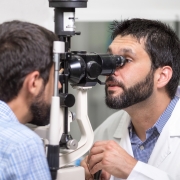Can Low Vision Be Reversed?
When most people think of low vision, blindness is the first thought that comes to mind. However, it is not considered to be blindness, since limited sight does still remain. But for those who suffer with this condition, it cannot be corrected by standard glasses, contact lenses, or even surgery. If you are questioning whether or not low vision can be reversed, keep the following information in mind when you visit with your eye doctor in Charlotte, NC.
What Causes Low Vision?
If you suffer from low vision, it was likely caused by diabetes, glaucoma, or age-related macular degeneration. Should your low vision in Charlotte, NC be caused by diabetic retinopathy, certain treatments may be available to maintain your current vision or possibly restore some vision. Yet in most cases, low vision will be permanent.
Common Types of Low Vision
Unfortunately, there are many types of low vision in Charlotte, NC. These include a loss of central or peripheral vision, night blindness, blurry vision, and hazy vision, which is characterized by your entire field of vision seeming to be covered by a glare or film.
Low Vision Aids Can Help
While your low vision may be permanent, the good news is that there are many different types of low vision aids that can improve your vision and quality of life. The most common include specialized telescopic glasses, magnifying glasses, hand magnifiers, and reading prisms. Should you suffer from retinitis pigmentosa and have no useful vision whatsoever, a retinal prosthesis may be an option. Able to partially restore vision, you may be able to successfully navigate sidewalks and doorways, read large lettering, and other tasks.
Since low vision cannot usually be reversed, prevention is key to maintaining as much of your sight as possible. Should you be diabetic or have other health conditions that could put your eyesight at risk, schedule regular appointments with your eye doctor in Charlotte, NC.

